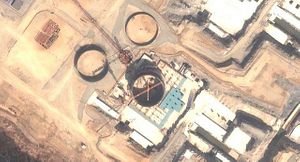The United States and North Korea “have been secretly discussing having ‘talks about talks,'” notes one headline over at the Washington Post, accurately capturing the long-standing hesitance and skepticism on both sides of the negotiating table. After all the hullabaloo toward the end of 2014 concerning the possibility that North Korea had sponsored a major cyber attack against Sony Pictures on U.S. soil, the two countries are trying to revisit the possibility of opening talks regarding denuclearization on the Korean peninsula. What, then, can be said about this latest effort at returning to talks?
Say what you will about the United States’ North Korea policy, but as Russia, China, and even Japan vacillate on their positions toward Pyongyang on a variety of issues, the U.S. has hardly budged from the position it held when the Six Party Talks died in 2009. In short, the United States’ position, emphasized as recently as fall 2014 by senior U.S. diplomats, is that the United States is unwilling to return to the Six Party Talks without guarantees from North Korea that it fully accepts the 2005 joint statement, which included affirmations from the United States, South Korea, and North Korea on denuclearization. Kim’s father, Kim Jong-il, had “committed to abandoning all nuclear weapons and existing nuclear programs and returning, at an early date, to the Treaty on the Nonproliferation of Nuclear Weapons and to IAEA safeguards” as part of that statement. Of course, much has changed in the meantime. North Korea has carried out multiple nuclear tests and the current regime sees its nuclear program as perhaps the best guarantor of its long-term security; as a result, its isolation from the international community has increased. The road back to the Six Party Talks is long indeed.
Still, if the United States agrees to sit down with North Korea (and possibly other members of the Six Party Talks process) and discuss denuclearization without an affirmation from Pyongyang regarding the 2005 statement, or a gesture of goodwill on denuclearization (such as creating a road-map for IAEA involvement in North Korea), we’d be seeing a major concession from Washington. The United States hasn’t budged on its position for years and doing so now would be unwise. Additionally, consider that the Obama administration has already staked considerable political capital on the precarious ongoing diplomatic process regarding Iran’s nuclear program, to much domestic criticism. Any talks with North Korea would thus need to abide by the strict preconditions that have been in place for sometime now.
According to the Washington Post report, which cites unnamed sources “with knowledge of the conversations” going on between North Korea and the United States, one current impediment to talks is North Korea’s Ebola quarantine. North Korea has effectively closed its borders and imposed a mandatory 21-day quarantine period for foreign arrivals; additionally, North Koreans, outside of the most senior members of the regime, have been barred from traveling outside the country (a privilege that most people in the country don’t get to exercise regularly anyway). Setting aside these practical issues, having U.S. officials visit North Korea for official talks on denuclearization would be a tacit recognition of North Korea’s nuclear status. Exceptional bilateral interactions such as U.S. Director of National Intelligence James Clapper’s November 2014 trip to North Korea to retrieve arrested U.S. citizens Kenneth Bae and Matthew Todd Miller left the nuclear issue entirely off the agenda.
Curiously, recent reports from South Korea note that Kim Jong-un himself threatened the United States: “If the American imperialists make the slightest move against our dignity, our independence and our right to survival, the U.S. mainland will suffer a terrifying catastrophe,” Kim said, according to South Korea’s Hankyoreh. Kim added that North Korea was no longer “willing to sit down with mad dogs.” The North Korean leader’s statement are an important reminder of the caprice that characterizes Pyongyang’s approach to diplomacy with the United States.
Realistically, we haven’t seen any hints of success in the United States’ preconditions for talks with North Korea on the nuclear issue since 2012’s Leap Day deal, in which North Korea agreed to suspend uranium enrichment for 240,000 tons of U.S. food aid. Of course, Pyongyang squandered any promise of sustained progress back toward the Six Party process when it carried out multiple missile and satellite launches later that year. For the moment, the only real area of sustained diplomatic progress between North Korea and the United States is the track-II process. Several well-connected former U.S. officials and bureaucrats have met with senior North Korean officials. In January, two former U.S. officials spoke with Ri Yong-ho, North Korea’s lead nuclear negotiator and vice foreign minister in Singapore.
I’m not holding my breath for a major breakthrough in U.S. diplomacy with North Korea on the nuclear issue at this point. Recent reports have suggested that one possibility would be for the United State’s special envoy for North Korea policy to meet senior North Korea officials in Beijing. This could be a relatively low-risk way for the U.S. government to test the waters with Pyongyang. Beijing hosted similar meetings for Japanese diplomats with their North Korean counterparts last year. Still, even if U.S. and North Korean officials make it to either side of the negotiating table in Beijing, there’ll be little to discuss without North Korean acquiescence to a set of demanding preconditions.

































